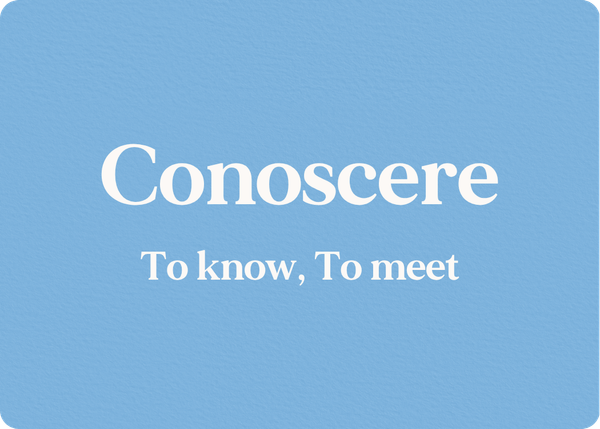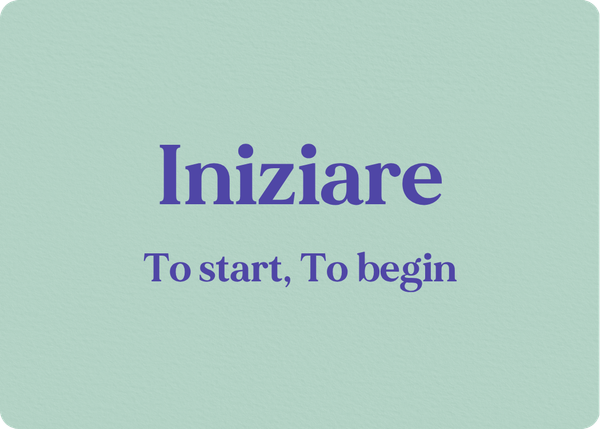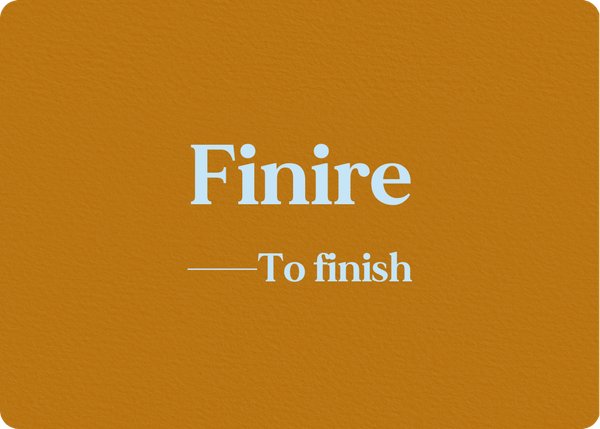What is Conoscere?
Conoscere is an irregular Italian verb meaning "to know" (in the sense of being familiar with someone or something), "to meet", or "to be acquainted with". It belongs to the second conjugation (-ERE verbs) but presents some irregularities.
This verb is useful for expressing knowledge of people, places, and experiences, making it very important for everyday Italian conversation.
Key Features of Conoscere
- Type: Irregular second conjugation verb (-ERE)
- Meaning: To know (someone/something), to meet, to be acquainted with
- Irregularities: Simple past (conobbi, etc.)
- Auxiliary verb: Uses "avere" (to have) for conjugation in compound tenses
- Past participle: Conosciuto
Indicativo – Indicative Mood
Presente (Present Tense)
| Person | Conjugation |
|---|---|
| io | conosco |
| tu | conosci |
| lui/lei | conosce |
| noi | conosciamo |
| voi | conoscete |
| loro | conoscono |
Example:
Conosciamo molto bene questa città.
We know this city very well.
Passato Prossimo (Present Perfect)
| Person | Conjugation |
|---|---|
| io | ho conosciuto |
| tu | hai conosciuto |
| lui/lei | ha conosciuto |
| noi | abbiamo conosciuto |
| voi | avete conosciuto |
| loro | hanno conosciuto |
Example:
Ho conosciuto mia moglie all'università.
I met my wife at university.
Imperfetto (Imperfect)
| Person | Conjugation |
|---|---|
| io | conoscevo |
| tu | conoscevi |
| lui/lei | conosceva |
| noi | conoscevamo |
| voi | conoscevate |
| loro | conoscevano |
Example:
Quando abitavano in quel quartiere, conoscevano tutti i vicini di casa.
When they lived in that neighborhood, they knew all the neighbors.
Trapassato Prossimo (Past Perfect)
| Person | Conjugation |
|---|---|
| io | avevo conosciuto |
| tu | avevi conosciuto |
| lui/lei | aveva conosciuto |
| noi | avevamo conosciuto |
| voi | avevate conosciuto |
| loro | avevano conosciuto |
Example:
Avevo conosciuto Giulia poco prima che si trasferisse a Roma.
I had met Giulia shortly before she moved to Rome.
Passato Remoto (Simple Past)
| Person | Conjugation |
|---|---|
| io | conobbi |
| tu | conoscesti |
| lui/lei | conobbe |
| noi | conoscemmo |
| voi | conosceste |
| loro | conobbero |
Example:
Conobbi tuo padre quando ero ancora al liceo.
I met your father when I was still in high school.
Trapassato Remoto (Past Anterior)
| Person | Conjugation |
|---|---|
| io | ebbi conosciuto |
| tu | avesti conosciuto |
| lui/lei | ebbe conosciuto |
| noi | avemmo conosciuto |
| voi | aveste conosciuto |
| loro | ebbero conosciuto |
Example:
Dopo che ebbe conosciuto i pericoli del mare, non navigò più.
After he had met the dangers of the sea, he never sailed again.
Futuro Semplice (Simple Future)
| Person | Conjugation |
|---|---|
| io | conoscerò |
| tu | conoscerai |
| lui/lei | conoscerà |
| noi | conosceremo |
| voi | conoscerete |
| loro | conosceranno |
Example:
La prossima settimana conosceremo il nuovo direttore della scuola.
Next week we will meet the new school principal.
Futuro Anteriore (Future Perfect)
| Person | Conjugation |
|---|---|
| io | avrò conosciuto |
| tu | avrai conosciuto |
| lui/lei | avrà conosciuto |
| noi | avremo conosciuto |
| voi | avrete conosciuto |
| loro | avranno conosciuto |
Example:
Quando finirai il corso, avrai conosciuto tante persone interessanti.
When you finish the course, you’ll have met lots of interesting people.
Congiuntivo – Subjunctive Mood
Presente (Present Subjunctive)
| Person | Conjugation |
|---|---|
| che io | conosca |
| che tu | conosca |
| che lui/lei | conosca |
| che noi | conosciamo |
| che voi | conosciate |
| che loro | conoscano |
Example:
Dubito che Angelica conosca veramente la situazione.
I doubt that Angelica knows the situation well.
Passato (Past Subjunctive)
| Person | Conjugation |
|---|---|
| che io | abbia conosciuto |
| che tu | abbia conosciuto |
| che lui/lei | abbia conosciuto |
| che noi | abbiamo conosciuto |
| che voi | abbiate conosciuto |
| che loro | abbiano conosciuto |
Example:
Mi dispiace che loro non abbiano conosciuto mio fratello.
I’m sorry that they haven’t met my brother.
Imperfetto (Imperfect Subjunctive)
| Person | Conjugation |
|---|---|
| che io | conoscessi |
| che tu | conoscessi |
| che lui/lei | conoscesse |
| che noi | conoscessimo |
| che voi | conosceste |
| che loro | conoscessero |
Example:
Vorrei che mio figlio conoscesse meglio la storia della nostra famiglia.
I wish my son knew our family history better.
Trapassato (Past Perfect Subjunctive)
| Person | Conjugation |
|---|---|
| che io | avessi conosciuto |
| che tu | avessi conosciuto |
| che lui/lei | avesse conosciuto |
| che noi | avessimo conosciuto |
| che voi | aveste conosciuto |
| che loro | avessero conosciuto |
Example:
Se avessimo conosciuto meglio la strada, non ci saremmo persi.
I would have preferred that you had had more confidence in me.
Condizionale – Conditional Mood
Presente (Present Conditional)
| Person | Conjugation |
|---|---|
| io | conoscerei |
| tu | conosceresti |
| lui/lei | conoscerebbe |
| noi | conosceremmo |
| voi | conoscereste |
| loro | conoscerebbero |
Example:
Conoscerei volentieri i tuoi genitori.
I would gladly meet your parents.
Passato (Past Conditional)
| Person | Conjugation |
|---|---|
| io | avrei conosciuto |
| tu | avresti conosciuto |
| lui/lei | avrebbe conosciuto |
| noi | avremmo conosciuto |
| voi | avreste conosciuto |
| loro | avrebbero conosciuto |
Example:
Avreste conosciuto tutti i dettagli se aveste letto attentamente il contratto.
You would have known all the details if you had read the contract carefully.
Imperativo (Imperative)
| Person | Conjugation |
|---|---|
| (tu) | conosci |
| (lui/lei) | conosca |
| (noi) | conosciamo |
| (voi) | conoscete |
| (loro) | conoscano |
Example:
Conosci te stesso e vivrai meglio!
Know yourself and you will live better!
Indefinite Moods
Infinito (Infinitive)
- Presente (Present): conoscere (to know, to meet)
- Passato (Past): avere conosciuto (to have known, to have met)
Examples:
È importante conoscere le proprie capacità.
It's important to know one's own abilities.
Sono felice di aver(e) conosciuto una persona così speciale.
I'm happy to have met such a special person.
Participio (Participle)
- Presente (Present): conoscente (knowing) - mainly used as adjective or noun
- Passato (Past): conosciuto (known, met)
Examples:
È solo un conoscente, non un vero amico.
He's just an acquaintance, not a true friend.
È una persona molto conosciuta in città.
He/She is a very well-known person in the city.
Gerundio (Gerund)
- Presente (Present): conoscendo (knowing, meeting)
- Passato (Past): avendo conosciuto (having known, having met)
Examples:
Conoscendo nuove persone, puoi imparare sempre qualcosa di utile.
By meeting new people, you can always learn something useful.
Avendo conosciuto molte difficoltà, ora apprezza di più le piccole cose.
Having experienced many difficulties, he now appreciates the small things more.
The verb Conoscere at a glance: Key tenses you need
| Present | Present Perfect | Imperfect | Present Subjunctive | Imperfect Subjunctive | Present Conditional |
|---|---|---|---|---|---|
| io conosco | io ho conosciuto | io conoscevo | che io conosca | che io conoscessi | io conoscerei |
| tu conosci | tu hai conosciuto | tu conoscevi | che tu conosca | che tu conoscessi | tu conosceresti |
| lui/lei conosce | lui/lei ha conosciuto | lui/lei conosceva | che lui/lei conosca | che lui/lei conoscesse | lui/lei conoscerebbe |
| noi conosciamo | noi abbiamo conosciuto | noi conoscevamo | che noi conosciamo | che noi conoscessimo | noi conosceremmo |
| voi conoscete | voi avete conosciuto | voi conoscevate | che voi conosciate | che voi conosceste | voi conoscereste |
| loro conoscono | loro hanno conosciuto | loro conoscevano | che loro conoscano | che loro conoscessero | loro conoscerebbero |
Conclusion
Mastering the conjugation of "conoscere" is essential for expressing knowledge, familiarity, and meeting people in Italian. This verb presents irregularities in the simple past forms, which require special attention and memorization.
Remember the key points:
- Uses "avere" as auxiliary verb for conjugation in compound tenses
- Irregular in simple past forms
- Past participle is "conosciuto"
- Distinguishes between knowing facts (sapere) and knowing people/places (conoscere)
- Essential for social interactions and expressing familiarity
Keep practicing with real sentences and contextual examples to master this Italian verb!





